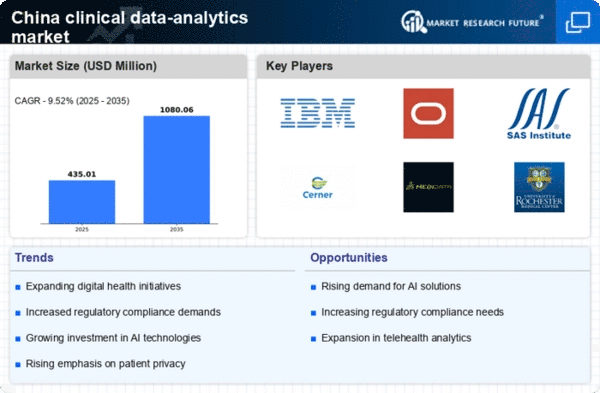Government Initiatives and Funding
Government initiatives in China are significantly influencing the clinical data-analytics market. The Chinese government has been actively promoting the adoption of digital health technologies, including data analytics, to improve healthcare delivery. Substantial funding has been allocated to support research and development in this sector, with an estimated investment of over $10 billion in health IT by 2025. These initiatives aim to enhance the efficiency of healthcare systems and improve patient care through data-driven insights. Furthermore, regulatory frameworks are being established to facilitate the integration of clinical data analytics into routine healthcare practices. As a result, the clinical data-analytics market is expected to benefit from increased public sector support, fostering innovation and encouraging private sector participation.
Emergence of Telemedicine Solutions
The emergence of telemedicine solutions is reshaping the clinical data-analytics market in China. As telehealth services gain traction, there is an increasing need for robust data analytics to support remote patient monitoring and virtual consultations. The market for telemedicine is expected to reach approximately $30 billion by 2025, indicating a substantial opportunity for clinical data analytics to enhance service delivery. By analyzing data collected through telemedicine platforms, healthcare providers can gain insights into patient behaviors, treatment adherence, and health outcomes. This integration of analytics into telemedicine not only improves patient engagement but also enables healthcare systems to optimize resource allocation. Thus, the clinical data-analytics market is likely to benefit from the growing adoption of telemedicine solutions.
Rising Demand for Personalized Medicine
The clinical data-analytics market in China is experiencing a notable surge in demand for personalized medicine. This trend is driven by the increasing recognition of the need for tailored treatment plans that cater to individual patient profiles. As healthcare providers seek to enhance patient outcomes, the integration of advanced analytics into clinical workflows becomes essential. Reports indicate that the market for personalized medicine in China is projected to reach approximately $100 billion by 2025, highlighting the potential for clinical data-analytics to play a pivotal role in this transformation. The ability to analyze vast datasets allows for the identification of specific biomarkers and genetic information, which can lead to more effective treatment strategies. Consequently, the clinical data-analytics market is likely to expand as stakeholders invest in technologies that support personalized healthcare initiatives.
Increased Focus on Population Health Management
The clinical data-analytics market in China is increasingly focused on population health management strategies. As healthcare systems evolve, there is a growing recognition of the importance of managing health outcomes at a population level. This shift is driven by the need to address chronic diseases and improve overall public health. By utilizing data analytics, healthcare providers can identify trends, assess risk factors, and implement targeted interventions. The market for population health management solutions is projected to grow significantly, with estimates suggesting a compound annual growth rate (CAGR) of around 15% through 2025. Consequently, the clinical data-analytics market is poised to expand as stakeholders invest in tools and technologies that facilitate effective population health management.
Growing Adoption of Electronic Health Records (EHRs)
The clinical data-analytics market is witnessing a growing adoption of Electronic Health Records (EHRs) across healthcare institutions in China. EHRs serve as a foundational element for effective data analytics, enabling healthcare providers to collect, store, and analyze patient data efficiently. As of 2025, it is estimated that over 80% of hospitals in China have implemented EHR systems, facilitating the integration of clinical data analytics into everyday clinical practice. This widespread adoption not only enhances data accessibility but also improves the quality of care through better-informed clinical decisions. The clinical data-analytics market is likely to thrive as healthcare organizations leverage EHRs to extract valuable insights, optimize treatment protocols, and enhance patient outcomes.
















